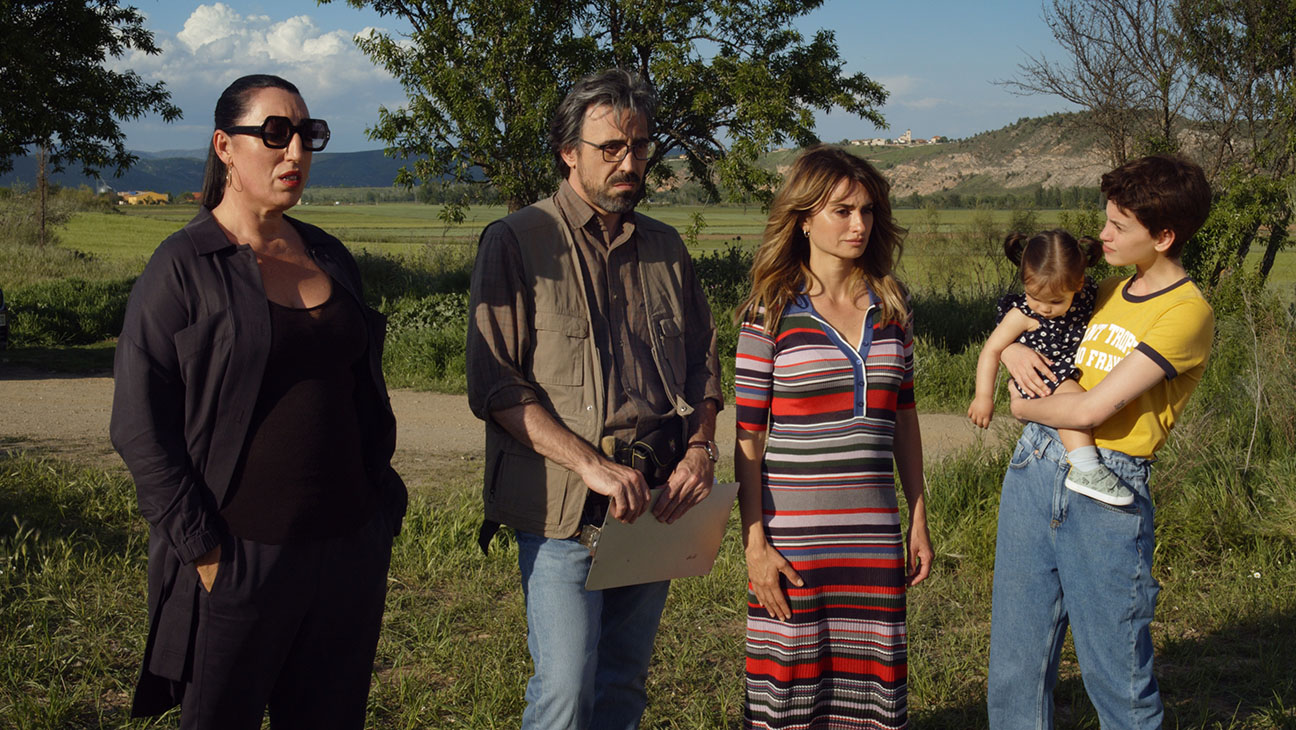Parallel Mothers review - letting the dead speak | reviews, news & interviews
Parallel Mothers review - letting the dead speak
Parallel Mothers review - letting the dead speak
Pedro Almodóvar digs up the past in a restrained exploration of Franco's legacy

Almodóvar has rarely returned to the petrified Spain of his youth, flinging off Franco’s oppression by ignoring it in his early films of freewheeling provocation, where anarchic, hot freedom was all of the law. In this sober tale of secrets and lies, though, his nation’s past is literally dug up.
Janis (Penélope Cruz) is a photographer living a chic Madrid life, but the village where she was raised is still haunted by the Fascist murder of her great-grandfather and others. Dishy forensic archaeologist Arturo (Israel Elejalde) agrees to help find the bodies, and in elegantly edited elisions we see them make love; Janis pregnant; then befriending teenage Ana (Milena Smit) in the maternity ward. Doubts about just whose baby Janis has brought home soon creep in, Alberto Iglesias’s score giving Hitchcock vibes to the domestic disquiet. When Ana bumps into Janis again, the need for truth and reconciliation suddenly strikes close to home.
 Almodóvar’s previous feature, Pain and Glory, seemed to signal a mature, reflective phase, as his great early star Antonio Banderas played a famous gay Spanish director aching with age, and immobilised by doubt. Almodóvar – whose press round for Parallel Mothers was unusually earnest – keeps quiet here. Sex scenes are discreet, colours muted pastel, the smoothly episodic narrative mostly set indoors, with few people. The machinery of filmmaking has vanished, Almodóvar’s experience letting him work invisibly, modestly. There are laughs, and tears, and mild, building unease as the matter of maternity comes to a head. But nothing distracts from Parallel Mothers’ true, serious purpose.
Almodóvar’s previous feature, Pain and Glory, seemed to signal a mature, reflective phase, as his great early star Antonio Banderas played a famous gay Spanish director aching with age, and immobilised by doubt. Almodóvar – whose press round for Parallel Mothers was unusually earnest – keeps quiet here. Sex scenes are discreet, colours muted pastel, the smoothly episodic narrative mostly set indoors, with few people. The machinery of filmmaking has vanished, Almodóvar’s experience letting him work invisibly, modestly. There are laughs, and tears, and mild, building unease as the matter of maternity comes to a head. But nothing distracts from Parallel Mothers’ true, serious purpose.
Cruz played the director’s Franco-era mother in Pain and Glory; along with Volver, Almodóvar’s only previous acknowledgement of the precise repression his work fizzingly overturned. Here, she’s masterfully natural, her star quality lighting up a more ordinary woman from within. Smit – a young sometime model, like Cruz when, aged 16, she blazed through Jamón, Jamón – is contrastingly soft-spoken and soft-featured. In a film where non-nuclear family options get built on the run (even as rural family roots run deep), Janis is part-mother, part-lover to Ana.
 Another veteran international Spanish star, Aitana Sánchez-Gijón (pictured with Smit), is Ana’s actual, actress mother Teresa, who chooses her theatrical big break over helping her daughter with parenthood, fiercely channelling her feelings of faded middle-age into Lorca’s Doña Rosita the Spinster. A long, appropriately theatrical scene with Almodóvar’s camera close in sees Teresa defend her maternal lacks to Janis. In a script of neat unity, the women’s politics – the sides they’d have taken in the war – rise to the surface. Of course, “apolitical” Teresa’s break came with a playwright shot by Fascists.
Another veteran international Spanish star, Aitana Sánchez-Gijón (pictured with Smit), is Ana’s actual, actress mother Teresa, who chooses her theatrical big break over helping her daughter with parenthood, fiercely channelling her feelings of faded middle-age into Lorca’s Doña Rosita the Spinster. A long, appropriately theatrical scene with Almodóvar’s camera close in sees Teresa defend her maternal lacks to Janis. In a script of neat unity, the women’s politics – the sides they’d have taken in the war – rise to the surface. Of course, “apolitical” Teresa’s break came with a playwright shot by Fascists.
Finally, everyone moves out to the wide, green fields and big sky of Janis’s rustic home. Her grandmother is among the few who remember the massacre, when her father climbed out of his muddy grave once, only to be reburied for good – the sort of story that has to be true. She was 3 then. As the archaeologists sieve bones as if planting seeds, her rattle turns up in the soil. When Cruz is joined by fellow Almodóvar old-stager Rossy de Palma (pictured above left with Smit, Elejalde and Cruz) on the villagers’ march towards the grave, it feels like a noble, communal act against forgetting, by cast as much as characters. As Eduardo Galeano’s closing epitaph insists, “History refuses to shut its mouth.” Perhaps it had to be Almodóvar, the antithesis of Franco’s patriarchal, cruelly religious Spain who became its symbolic replacement, who should finally be moved to let the dead speak.
rating
Explore topics
Share this article
The future of Arts Journalism
You can stop theartsdesk.com closing!
We urgently need financing to survive. Our fundraising drive has thus far raised £49,000 but we need to reach £100,000 or we will be forced to close. Please contribute here: https://gofund.me/c3f6033d
And if you can forward this information to anyone who might assist, we’d be grateful.

Subscribe to theartsdesk.com
Thank you for continuing to read our work on theartsdesk.com. For unlimited access to every article in its entirety, including our archive of more than 15,000 pieces, we're asking for £5 per month or £40 per year. We feel it's a very good deal, and hope you do too.
To take a subscription now simply click here.
And if you're looking for that extra gift for a friend or family member, why not treat them to a theartsdesk.com gift subscription?
more Film
 London Film Festival - a Korean masterclass in black comedy and a Camus classic effectively realised
New films from Park Chan-wook, Gianfranco Rosi, François Ozon, Ildikó Enyedi and more
London Film Festival - a Korean masterclass in black comedy and a Camus classic effectively realised
New films from Park Chan-wook, Gianfranco Rosi, François Ozon, Ildikó Enyedi and more
 After the Hunt review - muddled #MeToo provocation
Julia Roberts excels despite misfiring drama
After the Hunt review - muddled #MeToo provocation
Julia Roberts excels despite misfiring drama
 Ballad of a Small Player review - Colin Farrell's all in as a gambler down on his luck
Conclave director Edward Berger swaps the Vatican for Asia's sin city
Ballad of a Small Player review - Colin Farrell's all in as a gambler down on his luck
Conclave director Edward Berger swaps the Vatican for Asia's sin city
 London Film Festival 2025 - Bradley Cooper channels John Bishop, the Boss goes to Nebraska, and a French pandemic
... not to mention Kristen Stewart's directing debut and a punchy prison drama
London Film Festival 2025 - Bradley Cooper channels John Bishop, the Boss goes to Nebraska, and a French pandemic
... not to mention Kristen Stewart's directing debut and a punchy prison drama
 London Film Festival - from paranoia in Brazil and Iran, to light relief in New York and Tuscany
'Jay Kelly' disappoints, 'It Was Just an Accident' doesn't
London Film Festival - from paranoia in Brazil and Iran, to light relief in New York and Tuscany
'Jay Kelly' disappoints, 'It Was Just an Accident' doesn't
 Iron Ladies review - working-class heroines of the Miners' Strike
Documentary salutes the staunch women who fought Thatcher's pit closures
Iron Ladies review - working-class heroines of the Miners' Strike
Documentary salutes the staunch women who fought Thatcher's pit closures
 Blu-ray: The Man in the White Suit
Ealing Studios' prescient black comedy, as sharp as ever
Blu-ray: The Man in the White Suit
Ealing Studios' prescient black comedy, as sharp as ever
 The Woman in Cabin 10 review - Scandi noir meets Agatha Christie on a superyacht
Reason goes overboard on a seagoing mystery thriller
The Woman in Cabin 10 review - Scandi noir meets Agatha Christie on a superyacht
Reason goes overboard on a seagoing mystery thriller
 London Film Festival 2025 - crime, punishment, pop stars and shrinks
Daniel Craig investigates, Jodie Foster speaks French and Colin Farrell has a gambling habit
London Film Festival 2025 - crime, punishment, pop stars and shrinks
Daniel Craig investigates, Jodie Foster speaks French and Colin Farrell has a gambling habit
 I Swear review - taking stock of Tourette's
A sharp and moving tale of cuss-words and tics
I Swear review - taking stock of Tourette's
A sharp and moving tale of cuss-words and tics
 A House of Dynamite review - the final countdown
Kathryn Bigelow's cautionary tale sets the nuclear clock ticking again
A House of Dynamite review - the final countdown
Kathryn Bigelow's cautionary tale sets the nuclear clock ticking again

Add comment